Lying, pressuring Georgia officials: What does Trump indictment accuse his associates of doing?
Georgia election workers passing around USB sticks like vials of heroin or cocaine. Voting machines altering ballots. Thousands of felons, underage voters and even dead people casting ballots like a zombie apocalypse.
These were among the false and baseless allegations Donald Trump and his allies spread about the 2020 election. The Justice Department and Georgia state investigators found no evidence of widespread fraud. Former Attorney General Bill Barr called the allegations “complete nonsense.”
On Monday they became evidence of a broad criminal conspiracy allegedly led by Donald Trump and his allies to overturn the results of the 2020 election.
Fulton County District Attorney Fani Willis cobbled together an indictment detailing 161 separate acts sprawled across a half-dozen states and Washington, D.C., that she says fueled a criminal enterprise.
The narrative tracks closely with the revelations from the House special committee that investigated the Capitol riot on Jan. 6, 2021, and riveting testimony during 2022 hearings. But rather than ending in a thick report, the criminal allegations threaten prison time.
Here is a sample of what some of the most prominent defendants other than Trump are accused of doing in Georgia:
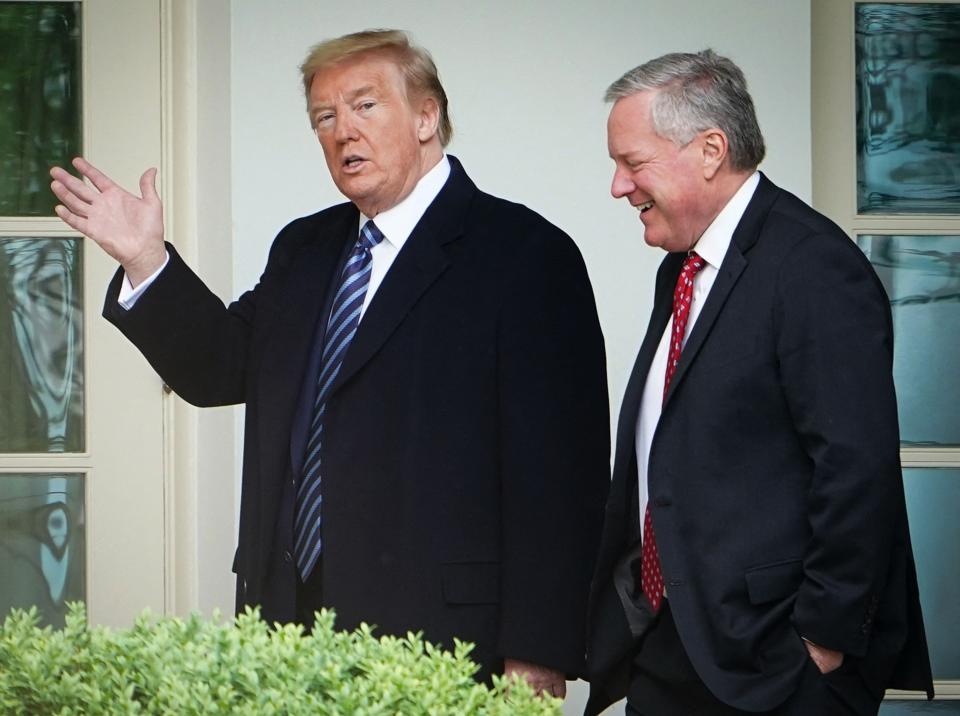
Mark Meadows
Mark Meadows, Trump’s final White House chief of staff, worked on claims of fake ballots being cast in Georgia, met with state election officials as they oversaw the vote count and coordinated efforts to overturn the results, according to the House investigation.
The indictment focuses on several steps Meadows took, beginning with Meadows and Trump asking political aide John McEntee sometime during December 2020 to prepare a memo outlining the strategy for Vice President Mike Pence, in his role as Senate president, to reject electoral votes from certain states during the congressional count on Jan. 6, 2021, and returning them to state legislatures. Pence refused to participate.
Meadows visited the Cobb County Civic Center in Georgia on Dec. 22, 2020, seeking to observe the audit of ballot signatures being performed by the Georgia Bureau of Investigation and Secretary of State’s office. Local officials prevented him from viewing the audit, which was not open to the public.
The next day, Meadows arranged for Trump to call Frances Watson, chief investigator for the Georgia secretary of state. Trump falsely stated he won the state “by hundreds of thousands of votes,” according to the indictment. Trump told Watson that “when the right answer comes out you’ll be praised,” according to the indictment.
Meadows sent Watson a text on Dec. 27 asking if there was “a way to speed up Fulton county signature verification” if the Trump campaign provided financial assistance.
Meadows participated in Trump's call on Jan. 2, 2021, to Georgia Secretary of State Brad Raffensperger urging him to “find” the votes he needed to win the state. By that point, Trump had tried to call him 18 times and Raffensperger had avoided taking the calls, according to the House investigation.
“I just want to find 11,780 votes,” Trump said during the call. “Give me a break. You know, we have that in spades already.”
'The perfect call' 7 moments in Trump's Georgia call now deemed 'overt act of conspiracy'
Georgia Gov. Brian Kemp said again Tuesday that the election wasn’t stolen.
“For nearly three years now, anyone with evidence of fraud has failed to come forward – under oath – and prove anything in a court of law,” Kemp said on the social media platform X. “Our elections in Georgia are secure, accessible, and fair and will continue to be as long as I am governor.”
Besides the racketeering count charged against all defendants, Meadows was charged with soliciting Raffensperger to violate his oath of office.
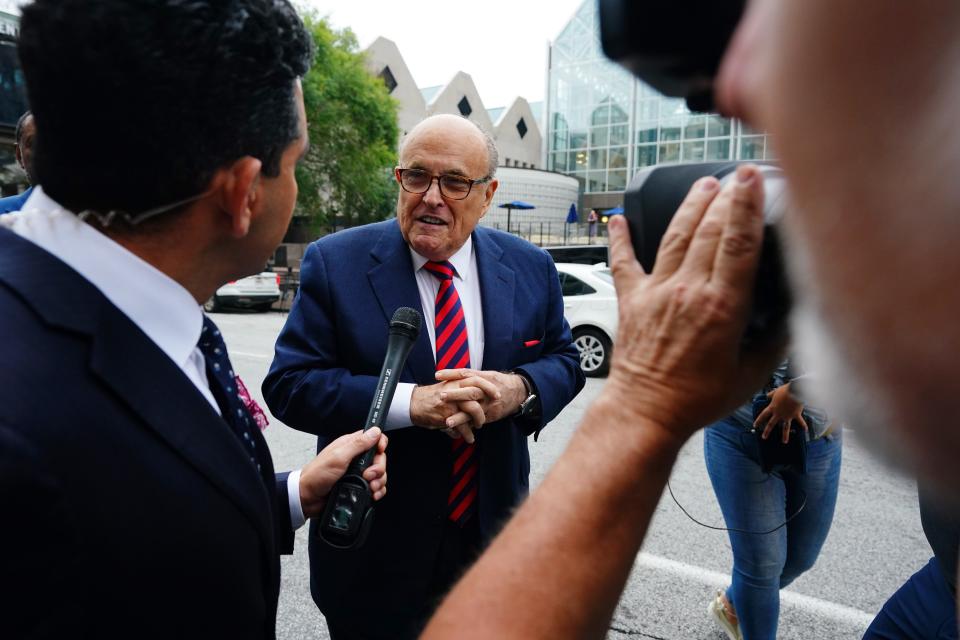
Rudy Giuliani
Rudy Giuliani, one of Trump's lawyers who claimed familiarity with voter fraud from his experience running for mayor in New York and as a former U.S. attorney, advocated claims of voter fraud that were debunked by state and federal officials.
The indictment cites Giuliani, along with Trump lawyers Jenna Ellis and Sidney Powell, for falsely claiming election fraud in Georgia and other states during a news conference Nov. 19, 2020, at the Republican National Committee headquarters.
Giuliani made the claims in a series of December 2020 meetings with Georgia lawmakers, according to the indictment:
On Dec. 3, in a meeting with members of a state Senate Judiciary subcommittee, Giuliani falsely claimed that 96,600 mail-in ballots were incorrectly counted and that voting machines in Michigan recorded 6,000 votes for President Joe Biden that were supposed to go to Trump.
On Dec. 10, in a meeting with members of the state House Governmental Affairs Committee, Giuliani’s statements alleged that election workers at State Farm Arena stole votes in plain sight, that 12,000 to 24,000 ballots were illegally counted and that election workers Ruby Freeman and Shaye Moss were “passing around USB ports as if they’re vials of heroin or cocaine." Freeman and Moss testified at a U.S. House hearing that they were passing ginger mints.
On Dec. 30, in a meeting with members of a Judiciary subcommittee, Giuliani’s statements included 2,560 felons voting illegally and 10,315 dead people voting.
The indictment said Giuliani called Georgia’s legislative leaders – Senate President Pro Tempore Butch Miller and House Speaker David Ralston – in December urging a special legislative session.
Besides the racketeering count, Giuliani was charged with three counts of soliciting lawmakers to violate their oath of office, three counts of making false statements and six conspiracy counts dealing with forgery and false statements for the recruitment of fake electors.
Giuliani said Tuesday on his podcast that he was indicted for being a lawyer and that a "two-tiered system of justice is no justice at all."
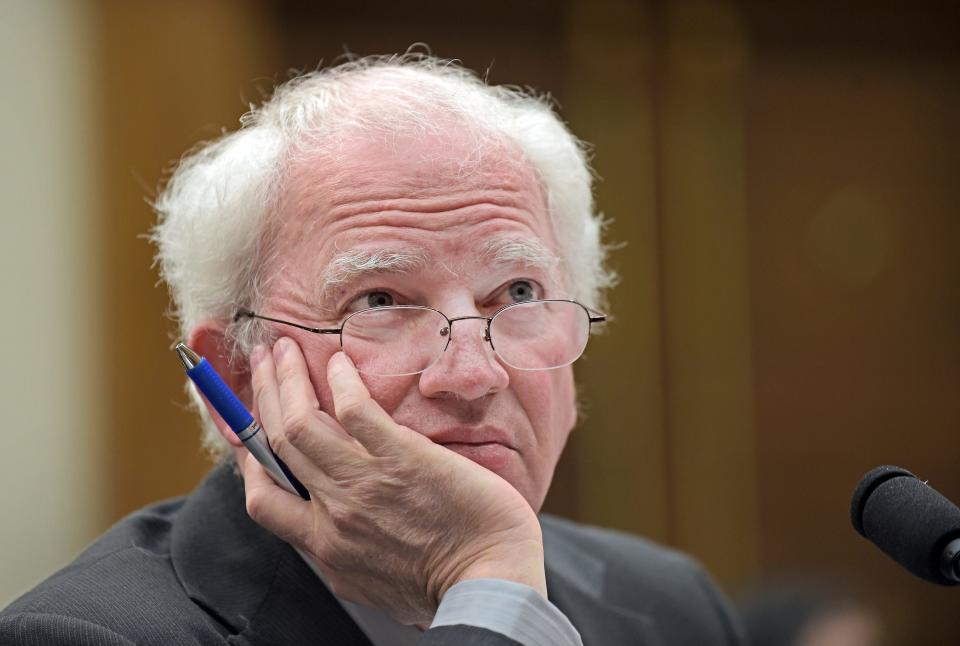
John Eastman
John Eastman, another Trump lawyer, helped develop the legal strategy for Pence to reject electors from key states so legislatures could name alternate electors who favored Trump.
Eastman acknowledged the Supreme Court would likely rule unanimously against the strategy, according to Pence counsel Greg Jacob. U.S. District Judge David Carter ruled in a civil case that Trump and Eastman “more likely than not” acted unlawfully in the scheme the judge described as “a coup in search of a legal theory.”
The indictment focused on several steps Eastman took to advocate for the strategy. For example, he participated in Giuliani's meeting with Georgia lawmakers Dec. 3, 2020.
Eastman sent an email on Dec. 6, 2020, to co-conspirator lawyer Robert Cheeley and state Sen. Brandon Beach stating Trump electors needed to meet Dec. 14, sign six sets of certificates and mail them to the Senate president.
Eastman sent an email Dec. 7 to Giuliani with a memo from another lawyer, Kenneth Chesebro, about “the real deadline for settling a state’s electoral votes.” Eastman sent an email Dec. 23 to Chesebro discussing fake electors. “The fact that we have multiple slates of electors demonstrates the uncertainty of either,” Eastman wrote. “That should be enough.”
Eastman and Trump allegedly filed false documents Dec. 31, 2020, by filing a lawsuit in federal court with “materially false statements” about Georgia voters, according to the indictment. The claims included “as many as 10,315 or more” dead people, “as many as 2,506 felons with an uncompleted sentence,” “at least 66,247 underage” people, “at least 2,423 individuals” not listed as being registered to vote and “at least 1,043 individuals” listing a post office box as their address, according to the indictment.
What happened Jan. 6?: A breakdown of the 187 minutes Trump was out of view on Jan. 6 as aides urged him to act
Earlier on the same day, Eastman sent an email to Trump campaign lawyers “admitting his knowledge that at least some of the allegations in the verified complaint were not accurate,” the indictment said.
Eastman met on Jan. 5, 2021, with Jacob and Marc Short, Pence’s chief of staff, to ask Pence to reject slates of presidential electors from Georgia and other states the next day when Congress counted the votes.
Eastman appeared at Trump’s rally near the White House on Jan. 6, 2021, and made false statements about the election, according to the indictment. Eastman sent Jacob an email that day urging Pence to adjourn the vote for 10 days to allow legislatures to investigate potential voting fraud, the indictment said.
Besides the racketeering count, Eastman was charged with soliciting state lawmakers to violate their oath of office, filing false documents for the lawsuit and six conspiracy counts dealing with the recruitment of fake electors.
Eastman has refused to answer questions from the U.S. House investigative panel or the Georgia grand jury, based on his Fifth Amendment right against self-incrimination.
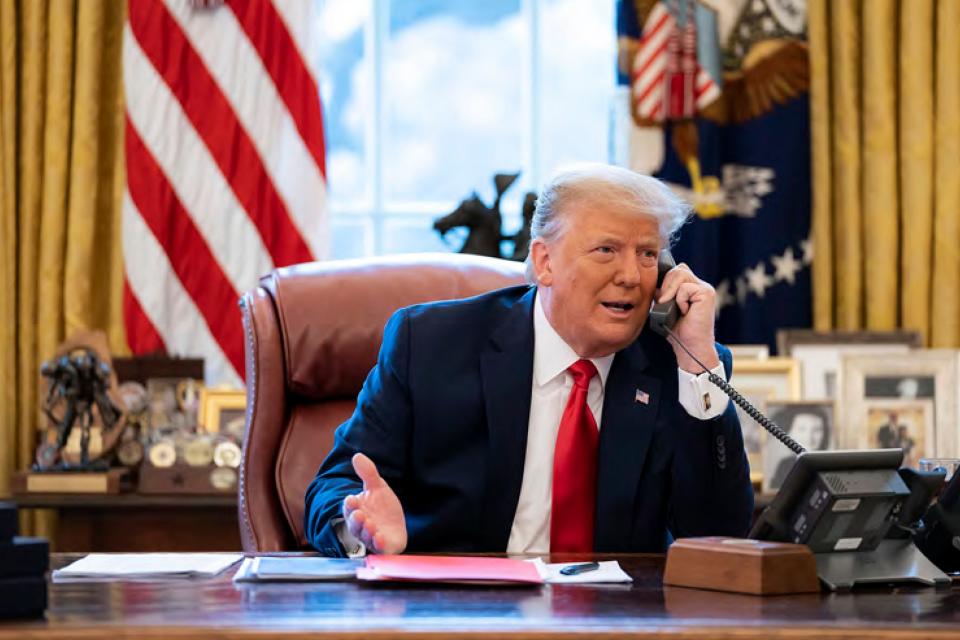
Kenneth Chesebro
Kenneth Chesebro, another lawyer working with Trump’s campaign, wrote a series of memos explaining how Trump electors in Georgia and other states could meet and cast votes for Trump despite his losses in those states. But he acknowledged the strategy was “somewhat dicey” in Georgia because of state requirements.
The strategy divided Trump campaign lawyers. Justin Clark, Trump’s deputy campaign manager and senior counsel, told the House investigation he had “real problems with the process” and “got into a little bit of a back and forth” with Chesebro.
As with Eastman, the indictment detailed steps Chesebro took to advocate for the strategy.
Chesebro sent an email on Dec. 10 to David Shafer, chairman of the Georgia Republican Party and one of the fake electors, saying the Trump campaign asked him to “help coordinate” logistics of electors voting. Chesebro sent Shafer an email that day with attached documents for casting electoral votes.
Chesebro sent Giuliani an email on Dec. 13 outlining strategies for disrupting and delaying the Jan. 6, 2021, session of Congress to count electoral votes. Chesebro said the strategies were “preferable to allowing the Electoral Count Act to operate by its own terms.”
Chesebro sent an email Dec. 13 to Mike Roman, a Trump campaign aide, with attached documents for Trump electors to use in Georgia and other states. Chesebro sent an email Dec. 13 to Roman saying Giuliani “wants to keep this quiet until after all the voting is done,” according to the indictment.
Besides the racketeering count, Chesebro was charged with six conspiracy counts dealing with forgery and false documents for the fake electors.
Chesebro also declined to answer House questions based on his Fifth Amendment right against self-incrimination.
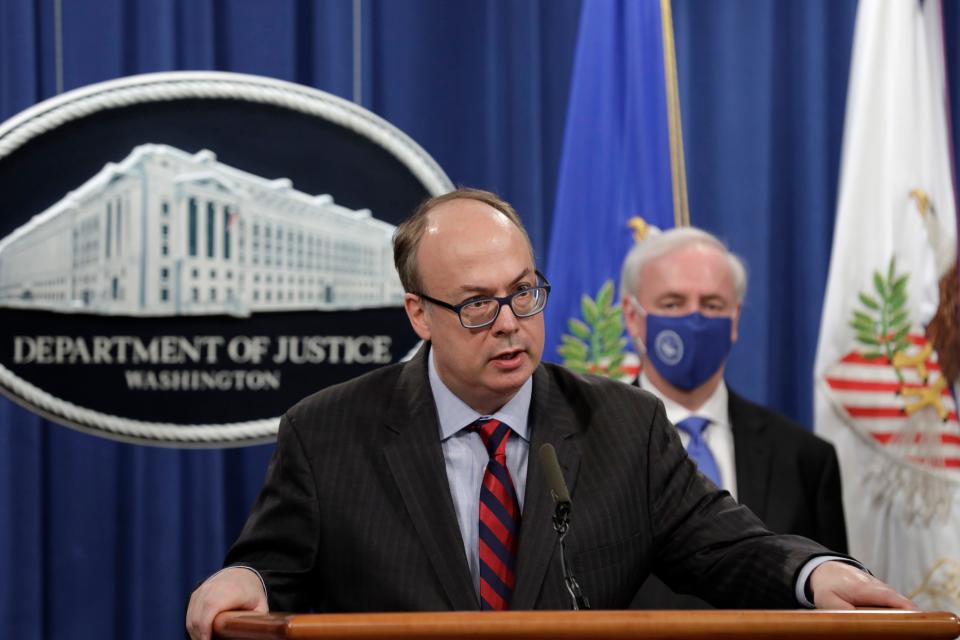
Jeffrey Clark
Jeffrey Clark, a former assistant attorney general for environmental issues at the Justice Department, was charged for drafting a letter with false statements about Georgia’s election for the attorney general. Trump briefly considered naming Clark attorney general but didn’t act after top department and White House lawyers threatened to resign.
Eric Herschmann, a former White House lawyer, told House investigators he was incredulous when he heard Clark’s strategy, calling it “asinine.”
Clark drafted the letter on Dec. 28, 2020, for Acting Attorney General Jeffrey Rosen to sign and send to Kemp and legislative leaders. The letter falsely said the department “identified significant concerns that may have impacted the outcome of the election in multiple States, including the State of Georgia,” according to the indictment.
Clark discussed the election during a 63-minute call Jan. 2, 2021, with Scott Hall, a Georgia bail bondsman who was also indicted. The same day, Clark asked Rosen and Acting Deputy Attorney General Richard Donoghue to sign and send the letter, which they refused.
Besides the racketeering count, Clark with charged with attempting to commit false statements.
Clark, too, declined to answer House questions under his Fifth Amendment right against self-incrimination.
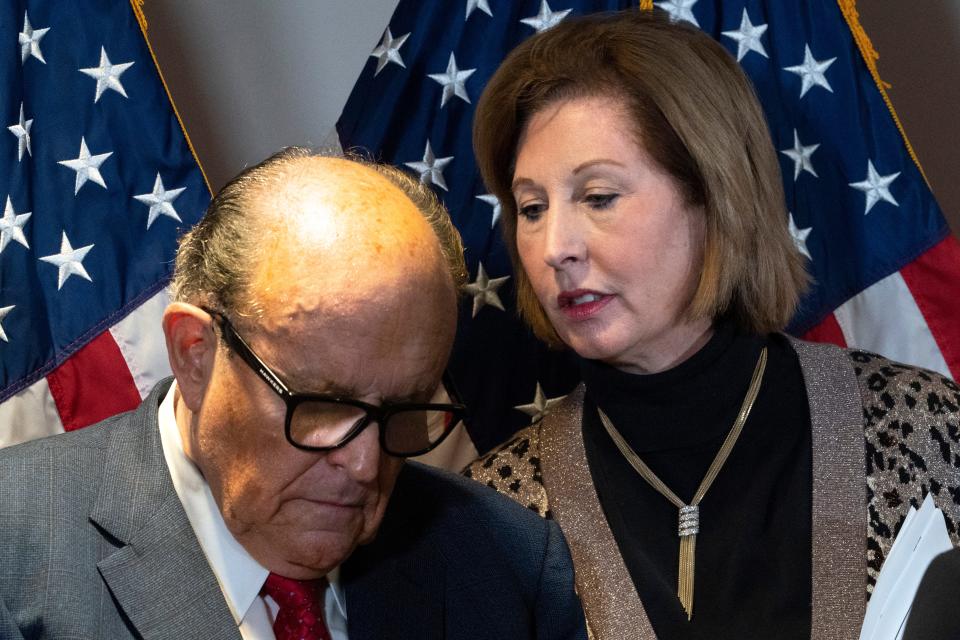
Sidney Powell
Sidney Powell, another Trump lawyer, became the public face of Trump’s legal challenges to the 2020 election, but law enforcement authorities found no justification for her claims of election fraud.
The indictment focuses in Georgia on her alleged tampering with voting equipment in Coffee County. She entered a written agreement Dec. 6, 2020, with SullivanStrickler LLC, a forensic data firm in Fulton County, to analyze voting equipment. An unlawful breach of equipment in Coffee County, Georgia, occurred under the agreement, according to the indictment.
Powell, Cathleen Latham, Scott Hall and Misty Hampton were charged with election interference for allegedly unlawfully tampering with electronic ballot markers and tabulating machines in Coffee County on Jan. 7, 2021. They were also charged with unlawful possession of ballots, computer theft, computer trespass and computer invasion of privacy. And they were charged with conspiracy to defraud the state by stealing voter data.
Powell met at the White House on Dec. 18, 2020, with Trump and Giuliani to discuss strategies for altering the outcome of the election, including seizing voting equipment, according to the indictment. Powell was named a special counsel with broad authority to investigate voter fraud allegations, the indictment said.
In a sworn deposition May 7, 2022, with the House investigative committee, Powell made false statements including that she “didn’t have any role in really setting up” attempts to access voting machines in Georgia or Michigan and that she didn’t “know what happened with that” or “remember whether that was Rudy or other folks.”
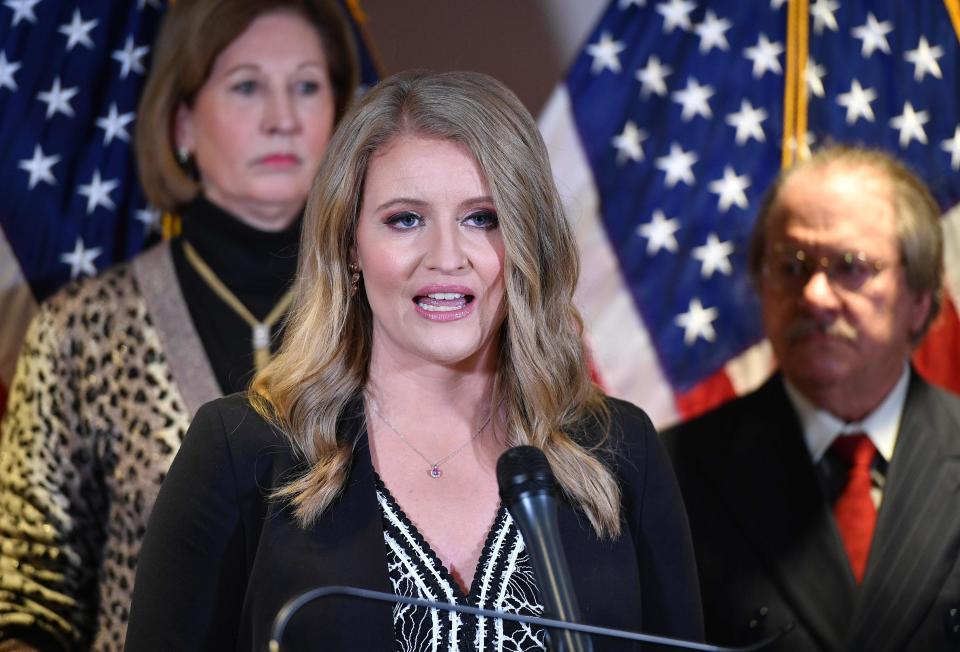
Jenna Ellis
Jenna Ellis, another Trump lawyer, joined Giuliani at many of his appearances making claims of election fraud. She attended the RNC news conference on Nov. 19, 2020; the Georgia meeting with lawmakers on Dec. 3, 2020, and several meetings in other states.
Ellis wrote a memo on Dec. 31, 2020, outlining the strategy for Pence to not open Electoral College documents from six states including Georgia, because of false allegations the electors were in dispute, according to the indictment.
Ellis wrote a memo on Jan. 5, 2021, saying Pence should begin the electoral vote count the next day in alphabetical order of states and “simply stop the count” when he got to Arizona, one of the states Trump was contesting.
Besides the racketeering count, Ellis was charged with soliciting Georgia lawmakers to violate their oath of office.
This article originally appeared on USA TODAY: Why were Rudy Giuliani, Mark Meadows, others indicted with Trump?
